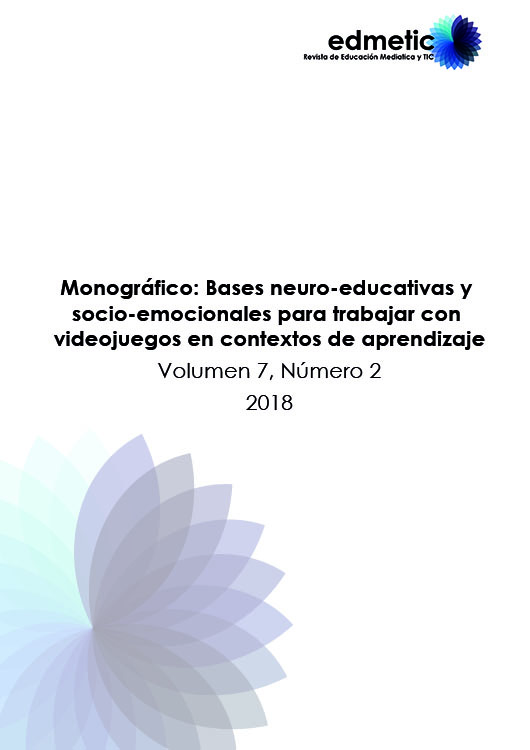¿El poder de la gamificación educativa? The power of educational gamification?
Main Article Content
Downloads
Article Details
TRANSFER RIGHTS AND COMMITMENTS TO EDMETIC, REVISTA DE EDUCACIÓN MEDIÁTICA Y TIC
E-ISSN: 2254-0059
The undersigned author(s) of article entitled:
- Transfer to EDMETIC, Revista de Educación Mediática y TIC publishing rights of the article mention before. The magazine will have the right to publish in any format or media this article.
- The author(s) claim that this article is original and which has not been published before in any format and wasn´t submitted for evaluation to another publication.
- The author(s) claim that this article has the copyright´s permissions for publication
- The author(s) accept the changes to the contents on the review, and changes in the style of the manuscript by the Editorial Board of EDMETIC, Revista Educación Mediática y TIC.
- The author(s) declare that they have complied with the ethical principles of research.
- The author(s) not be subject to personal or business association that involves a conflict of interest with article presented
- El author(s) undertakes to give the primary sources of information, if requested.
Date:
Author(s) names and signatures (1):
(1) Fill the form and send to: revistaedmetic@uco.es
References
BRICEÑO, W., MENDOZA, N., QUINTERO, J., MALAGÓN, S., y FONSECA, F. (2017). El videojuego como herramienta de representación. Un análisis espacial y cultural de World of Warcraft. LifePlay: Revista académica internacional sobre videojuegos, 6, 82-96. Recuperado de http://www.lifeplay.es/volumen6/Dossier/084_WILBELYS%20B.%20ET%20AL_Manuscrito%2084-95.pdf
DEL MORAL, E., GUZMÁN, A.P., y FERNÁNDEZ, L.C. (2018). Game-Based Learning: Increasing the Logical-Mathematical, Naturalistic, and Linguistic Learning Levels of Primary School Students. NAER, Journal of New Approaches in Educational Research, 7(1), 31-39. doi: 10.7821/naer.2018.1.248
DORANTES, G. (2017). El uso prolongado de videojuegos violentos influye en la percepción de la violencia de adultos jóvenes. PSIENCIA. Revista Latinoamericana de Ciencia Psicológica, 9(2). doi: http://dx.doi.org/10.5872/psciencia.v9i2.217
MARÍN, V (2011). La perspectiva educativa de los videojuegos. Una realidad tangible. Revista Conecta2, 2 (II), 63-79. Recuperado de http://www.revistaconecta2.com.mx/Archivos/II_EDICION/2_3.pdf
MARÍN, V. (2016). ¿Hay posibilidades de trabajar la inclusión a través de los videojuegos? Revista del Salomé, 1(2), 67-87
MARÍN, V., y MARTÍN, J. (2014). ¿Podemos utilizar los videojuegos para el desarrollo del currículo de la etapa de infantil? NAER, Journal of New Approaches in Educational Research, 3(1), 20-25. doi: 10.7821/naer.3.1.20-25
MARÍN, V., y SAMPEDRO, B.E. (2016). Innovando en el aula de Educación Primaria con GT 6. International Journal of Technology and Educational Innovation, 2(1), 13-19. Recuperado de http://revistas.uma.es/index.php/innoeduca/article/view/1061/1870
MARIN-DÍAZ, V., MORALES-DÍAZ, M., & RECHE-URBANO, E. (2018). Posibilidades educativas de los videojuegos en la etapa de Primaria según los maestros en formación. Estudio de caso. NAER, Journal of New Approaches in Educational Research, En prensa.
QUESADA, A., y TEJEDOR, S. (2016). Aplicaciones educativas de los videojuegos: el caso de World of Warcraft. Pixel-Bit: Revista de Medios y Educación, 48, 187-196. doi:10.12795/pixelbit.2016.i48.12
RAMOS, S., y BOTELLA, A.M. (2016). La integración del videojuego educativo con el folklore. Una propuesta de aplicación en Educación Primaria. Revista Electrónica Interuniversitaria de Formación del Profesorado, 19(3), 115-121. doi: http://dx.doi.org/10.6018/reifop.19.3.267581
